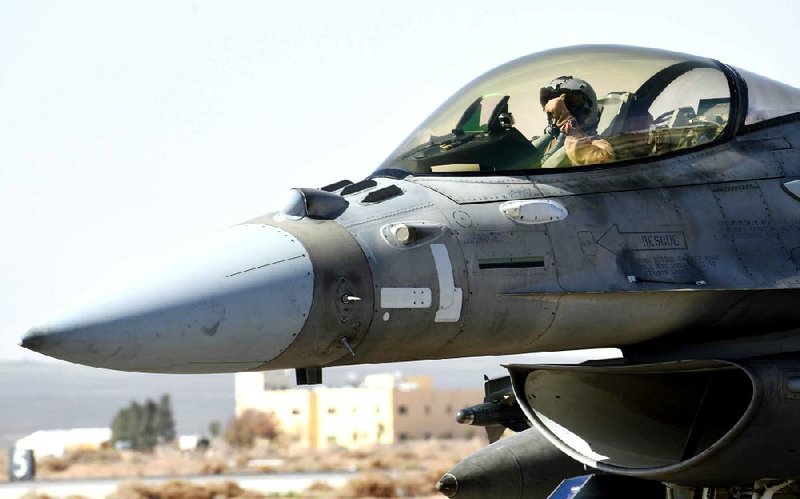WASHINGTON -- The White House circulated a proposal Tuesday to authorize the Pentagon to fight Islamic State terrorists without an "enduring offensive combat" role, an ambiguous phrase designed to satisfy lawmakers with widely varying views on the need for U.S. ground operations.
RELATED ARTICLES
http://www.arkansas…">American hostage confirmed deadhttp://www.arkansas…">Emirates' F-16 jets return to the fight, flying out of Jordan
Sen. Bob Menendez, D-N.J., said President Barack Obama would seek an authorization for the use of force that would expire after three years. It would end the approval for operations in Iraq that Congress passed in 2002.
Menendez spoke after he and other Democratic senators met privately with top White House aides on the eve of an anticipated formal request for legislation from the president.
"Hopefully there will not be a significant delay in Congress acting," said White House press secretary Josh Earnest.
The meetings unfolded against a fresh reminder of the threat posed by terrorists who occupy large areas of Syria and Iraq -- the confirmed death of a 26-year-old American aid worker who had been held hostage by the group.
Obama pledged to bring anyone responsible for Kayla Mueller's captivity and death to justice "no matter how long it takes."
Of immediate concern was the search for a compromise that could satisfy Democrats, most of whom oppose the use of American ground forces in the fight against the Islamic State, and Republicans, who largely favor at least leaving the possibility open.
Menendez said the White House's proposal remained subject to modification. "That's where the rub will be" as the White House tries to win approval for the legislation, he said.
One senior Democrat, Sen. Barbara Mikulski of Maryland, said she had significant questions about the president's proposal.
"I don't know what the word 'enduring' means. I am very apprehensive about a vague, foggy word," she said.
"'Enduring' is not in the eyes of the beholder," she said. "'Enduring' has to have a clock to it."
Maine's Sen. Angus King, an independent who caucuses with Democrats, said the language is meant to distinguish between "special forces going in for a period of a few days" and a long-term deployment of ground troops.
Other Democrats said they want strong limits on the use of combat troops.
"We should not give authority that could be used for introducing ground troops," said Sen. Ben Cardin, D-Md.
Menendez also said Tuesday that it was not yet clear whether the proposal would cancel a 2001 authorization for the use of force against terrorists that Congress approved shortly after the attacks of Sept. 11, 2001.
Obama so far has relied on that and the 2002 congressional authorization, which President George W. Bush used to justify military action after 9/11. He said last year he had the legal authority necessary to deploy more than 2,700 U.S. troops to train and assist Iraqi security forces and conduct airstrikes against Islamic State targets in Iraq and Syria.
Several other lawmakers who were briefed in earlier meetings said the president would likely seek legislation exclusively targeting the fighters seeking establishment of a caliphate, or state ruled by Islamic law, wherever they are and whatever name they use.
Apart from the midday meeting with Democrats in the Capitol attended by White House Chief of Staff Denis McDonough, some Republicans expressed concern with other elements of the administration's emerging proposal.
Sen. Lindsey Graham, R-S.C., said administration officials had told him it would not provide for the protection of U.S.-trained Syrian rebel troops on the ground in the event of an air attack by Syrian forces loyal to President Bashar Assad.
"It's an unsound military strategy. I think it's immoral if the authorization doesn't allow for us to counter Assad's air power," he said.
Limiting the resolution to target Islamic State forces "will allow Bashar Assad to butcher all he wants to," said Sen. John McCain, R-Ariz. "That's insane."
Despite the debate over the details, there was little evident dispute in Congress that new legislation is needed, both to replace outdated authorizations and to show a bipartisan desire to defeat the Islamic State.
But Rep. Steny Hoyer, D-Md., said some Democratic lawmakers want to set geographic limits and restrict the types of forces that can be used.
"They want some time limit so we can reconsider at some point in time, whether it's 24 months, 36 months, 48 months," he said.
The proposed time frame means the next president would have to return to Congress for further action.
Republicans praised Obama's willingness to seek legislation.
"This president, you know, is prone to unilateral action. But when it comes to national security matters, and particularly now fighting this barbaric threat -- not only the region but to our own security -- I think it's important to come to Congress and get bipartisan support," said John Cornyn of Texas, the Senate's second-ranking Republican leader.
But many Republicans said they prefer legislation that at least permits the use of ground troops if Obama decides they may be necessary. Some, including McCain, have gone further, saying ground troops are needed if the Islamic State fighters are to be defeated.
"I don't think you can be the most powerful nation in the world, and have the history we have of fighting for democracy and freedom, and totally eliminate the possibility of using forces if they're needed," said Sen. Johnny Isakson, R-Ga.
Information for this article was contributed by David Espo, Nedra Pickler, Andrew Taylor, Laurie Kellman and Alan Fram of The Associated Press and by Kathleen Hunter, Billy House, Joe Sobczyk, James Rowley, Roxana Tiron, David Lerman, David Weigel and Angela Greiling Keane of Bloomberg News.

